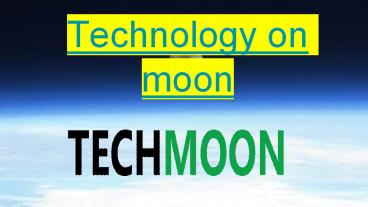https://technologymoon.com/ - PowerPoint PPT Presentation
Title: https://technologymoon.com/
1
Technology on moon
2
- Space technology is technology developed by space
science or the aerospace industry for use in
spaceflight, satellites, or space exploration.
Space technologyincludes spacecraft, satellites,
space stations, and support infrastructure,
equipment, and procedures. - I would feel more optimistic about a bright
future for man if he spent less time proving that
he can outwit Nature and more time tasting her
sweetness and respecting her seniority. - Read more at
3
- From the moon to mass production 10 pieces of
modern tech indebted to Apollo
4
How NASA Tracked Apollo 11 to the Moon and Back
with 1960s Tech
NASA relied on the U.S. State Department to
implement an extensive global network of antennas
to collect radio signals from the Apollo
missions, including the first moon landing, which
occurred 50 years ago. The monitoring system,
collectively referred to as the Spaceflight
Tracking and Data Network, has gone through
various incarnations It cut its teeth tracking
the first artificial satellites around Earth. By
the time the first American flew in space, NASA
had already established at least 30 ground
stations on five continents several islands and
aboard ships sailing the Atlantic, Indian and
Pacific oceans, according to author Sunny Tsiao
in the NASA History Series digital book "Read You
Loud and Clear!" (2008).
5
Officials at NASA wanted to maintain contact with
Apollo's Eagle
it descended to the moon's surface after
emerging from behind the moon. If the Apollo 11
crew needed to abort the landing, there was a
very short period of time in which they could
make the decision. And the moon would be visible
in Australia when this crucial moment was
scheduled to occur. Honeysuckle Creek carried
most of NASA's communications with Armstrong and
Aldrin during their extravehicular activity. The
most crucial of those communications were
biomedical data from the astronauts' Portable
Life Support System backpacks. Most of the data
from the Columbia command module, which carried
astronaut Michael Collins, traveled to the
26-meter antenna at Tidbinbilla. These
telescopes are now part of the Canberra Deep
Space Communication Complex. The CDSCC supports
NASA's Deep Space Network, which now receives
information from spacecraft much farther away in
the solar system, including the Voyager probes
that have crossed into interstellar space.
6
How NASA Broadcast Neil Armstrong Live from the
Moon.
7
To free up space for a television downlink from
the lunar module, NASA removed the ranging code
and changed the modulation from phase to
frequency. This freed up 700 kHz of bandwidth for
a television downlink on the USB signal.
Technology on moon
8
THANK YOU































